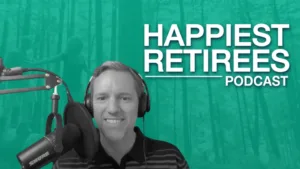Matthew McConaughey’s persona has become ubiquitous in American society. At times it feels like his charm and confidence willed him to stardom. There’s no denying his acting talent, but he’s also one hell of a public speaker. I’ve always been a sucker for graduation speeches, and when I came across the one he delivered at the University of Houston in 2015, it spoke to me. I couldn’t help but notice how well his advice applied to retirement planning and investment strategy.
How To Not Be a Dazed & Confused Investor
The investment path is paved with uncertainty, but throw a pandemic, hyperinflation, massive Fed intervention, and bitterly divided government into the cement mix and the bumps in the road start to threaten your alignment. With all this unease, I thought there was no one better to ease our anxieties than the man who oozes poise. So, here is some of Matthew McConaughey’s graduation advice with the lens refocused on investments. Alright, alright, alright.
1. Life Is Not Easy
Nor is investing. Remembering that investing takes time and discipline is especially crucial during challenging periods. Planning to become an overnight millionaire with the next meme stock isn’t investing. It’s gambling.
Rome wasn’t built in a day, and your portfolio won’t be, either. So educate yourself about the companies involved and create a diversified, income-generating apparatus.
Remember that there will always be aches and pains along the way. That’s okay. Life isn’t always easy, but you aren’t alone. You don’t think Warren Buffett ever had a bad day, week, month and year in the market? Of course, he has; it’s the price of doing business. But he summons enough wisdom and patience to let the bad days transition into good ones. If you can do the same, perhaps you’ll become one of the wealthiest people in the world. Okay, maybe that’s aiming a bit high, but you get the idea.
2. “Unbelievable” Is the Stupidest Word in the Dictionary
Matthew McConaughey doesn’t like this word, and neither do I. It’s used far too often to describe the rise and fall of equities. “Stock X is up or down 75 percent. It’s unbelievable!” No, it’s not. Market history is full of outrageous examples. As an example, what if I told you that Warren Buffett’s overall Berkshire Hathaway performance from 1964 through 2022 gained 3,787,464 percent? Is that unbelievable? Nope. It’s true! I’m not saying you’ll reach that peak, but with time and discipline, many “unbelievable” things start looking possible.
3. Choose Joy Over Happiness
McConaughey describes happiness as an emotional response to an outcome but says joy is the constant feeling we get when we pursue our natural interests.
This may be my favorite message from his speech because that’s what I’ve dedicated my professional life to helping retirees do. I write articles about it, record podcasts and radio shows, and talk to my clients about it. My last book, What the Happiest Retirees Know: 10 Habits for a Healthy, Secure, and Joyful Life, covers the topic extensively.
Using the word “joyful” in the title was intentional. It may be the most important word in the entire book. We used ten habits to explain how to live a life with purpose and joy: money habits, curiosity habits, family habits, love habits, faith habits, social habits, health habits, home habits, investing habits, and spending habits.
4. Define Success For Yourself
Write down your investing goals, literally. There’s something about having a tangible list that often helps. Then sit back and look at each one. Contemplate what’s behind each one. Are you trying to leave money for your kids? Donating to charity? Creating a future income stream to be diverted from the reservoir in retirement? Are you focused on parenthood, physical health, mental health, career, or friendships?
Or, perhaps, you’re even trying to get that nest egg up to $100 million. Remember, the word “unbelievable” has been removed from our dictionary. Figure out what success means for you. Then, go get it.
5. Process Of Elimination Is the First Step to Our Identity
Don’t tell Kenny Rogers, but the gambler would be a terrible investor. We generally don’t focus on meme stocks, bitcoin, NFTs, or other get-rich-quick strategies. Sure, there’s room to play if you have a little extra money, but for the most part, we consider these excesses in the market.
Decide what your investment strategy is and stick to it. Do you want to invest in growth or value stocks? Are ESG (Environmental, Social, and Corporate Governance) principles essential to you? Whittle down your options. Separate the wheat from the chaff. McConaughey used an example of his iconic character, Wooderson, from the movie Dazed and Confused. The director kept offering him more scenes, and he kept accepting because he was new to the movie business and eager to work. In retrospect, some of these scenes weren’t true to Wooderson’s character, and he felt they were detrimental to the character.
Figure out who you are and what you want, then clear away the options that don’t serve those aims. As McConaughey said, knowing who we are is hard, so why not make it a little easier? Eliminate who you are not first, and then you’ll almost accidentally find yourself where you need to be.
6. Don’t Leave Crumbs
McConaughey interprets crumbs as questionable choices that hurt us down the road. With retirement planning, that can mean going out on a limb rather than sticking to the plan. So many folks pull money out when the market falls, only to miss the incredible recovery. Do you think they don’t regret letting panic override their investment plan?
Dedicate the time it takes to make good decisions, so you don’t end up anxiously looking over your shoulder in the future. If you leave crumbs today, they will cause you more stress tomorrow.
7. Dissect Your Success and Reciprocity of Gratitude
McConaughey points out that we tend to focus on our failures. Instead of obsessing over those, he suggests dissecting our successes with gratitude — giving thanks for the things that are working. When we do this, he says, that gratitude tends to reciprocate and gives us more things for which we can be grateful.
From a financial standpoint, I give thanks for what I call the Army of American Productivity. No matter how much the market may drop in a given day, we live in the country with the most productive economy in the world. Most people aren’t that lucky.
As McConaughey says, life is a verb. We try our best even though we don’t always do our best. No person or entity is perfect, but every business wants to grow, and every human wants to feed their family. When these two goals overlap, it creates the harmony of progress and growth of earnings. The companies listed on the S&P 500 have millions of employees working every single day. That unstoppable inertia is the driving force that pushes our economy to new heights, and it’s why I keep investing in the United States.
8. Make Voluntary Obligations
Here, McConaughey tells us that everyone needs to live by their own code. Sure, there are society’s hard and fast laws, but he’s referring to the standards of integrity that we each decide to live by. It reminds me of a character named Omar Little from HBO’s The Wire. Omar was a hardened criminal whose chosen profession was robbing drug dealers. But when a rival framed him for murdering a tax-paying, law-abiding citizen and one of the detectives nearly fell for the ruse, Omar protested, “Come on now, when you ever know me to put my gun on anybody that wasn’t in the game?” Here was a stone-cold killer offended that anyone might think him capable of breaking the voluntary obligations he had set for his life. “A man got to have a code,” he explained.
There are voluntary obligations we can each incorporate into our retirement planning. One of the most vital is to put your savings on auto to remove any temptation or forgetfulness. Let gravity push your hard-earned money toward investments.
Over time, despite the peaks and valleys, there’s a good chance your money will continue to grow and compound. Think of it as a bit of pain in the wallet now that can lead to a joyful retirement later.
9. From Can to Want
On this point, McConaughey tells the story of the first time he was successful enough to hire a maid. He was so excited about her pressing his jeans that he forgot to notice his aversion to how it looked. It helped him realize that “because I can” is not a good enough reason to do something.
Similarly, it’s essential not to consider saving and investing as “spending money” on stocks. Instead, think of it as investing in your future. Get excited about that. You are taking steps toward financial freedom. Embrace the ups and downs. They’re just part of the process. Don’t let them derail you from a long-term, disciplined approach.
10. A Roof Is a Man-Made Thing
McConaughey tells a tale of the 1993 Houston Oilers jumping to a 35-3 lead in an NFL playoff game before eventually losing. He mused about why and suggested it may have been a case of the team putting a roof, or ceiling, on themselves — thinking it was all too good to be true and limiting their path to victory.
With investing, this can manifest when we try to play it too safe or cut our losses before they have time to grow.
11. Turn the Page
McConaughey chronicles the story of a successful musician with a drug problem who found the courage to admit his problem, forgive himself, and move forward. With investing, this attitude can come in handy. Mistakes are made; there’s no way around that. But, unfortunately, no investor is perfect, and the market doesn’t come with an instruction book or crystal ball.
When a mistake knocks you down, simply get back up, dust yourself off, and try again, using the lesson learned from misfortune to inform your future actions. Retirement planning isn’t about perfection. It’s about participation. As McConaughey says, you’re the author of the book of your life. Turn that page.
12. Give Your Obstacles Credit
McConaughey brings up those “No Fear” t-shirts that were en vogue a couple of decades ago. He confesses his disdain and confusion for the message they conveyed. No fear? Who doesn’t have any fear? Furthermore, who thinks having no fear is a productive aim?
McConaughey says he tries to scare himself at least once per day. Whether that means asking someone on a date, getting butterflies about a challenging day at work, or asking for a raise, he thinks fear is something to overcome rather than ignore. The fear signifies an obstacle, on the other side of which lies progress and growth.
There are plenty of obstacles in investing. When is the right time to buy? To sell? If the market is down 20 percent, should you stay out until it bottoms? How do you know when it will bottom? (Hint: you don’t!)
Other than Matthew McConaughey’s surprising acumen for retirement planning, the bottom line is that life and investments are both about choices. You can’t control which scenarios will arise, but you can manage your reactions. Arm yourself with the tools you need to make sound judgments, and then give them time to develop. No one person or company is perfect, but with thoughtful and deliberate actions, we can be happy, healthy, and secure.
This information is provided to you as a resource for informational purposes only and is not to be viewed as investment advice or recommendations. Investing involves risk, including the possible loss of principal. There is no guarantee offered that investment return, yield, or performance will be achieved. The mention of any company is provided to you for informational purposes and as an example only and is not to be considered investment advice or recommendation or an endorsement of any company. The reader should not assume that an investment in the securities identified was or will be profitable. Stock prices fluctuate, sometimes rapidly and dramatically, due to factors affecting individual companies, particular industries or sectors, or general market conditions. For stocks paying dividends, dividends are not guaranteed, and can increase, decrease, or be eliminated without notice. Fixed-income securities involve interest rate, credit, inflation, and reinvestment risks, and possible loss of principal. As interest rates rise, the value of fixed-income securities falls. Past performance is not indicative of future results when considering any investment vehicle. This information is being presented without consideration of the investment objectives, risk tolerance, or financial circumstances of any specific investor and might not be suitable for all investors. There are many aspects and criteria that must be examined and considered before investing. Investment decisions should not be made solely based on information contained in this article. This information is not intended to, and should not, form a primary basis for any investment decision that you may make. Always consult your own legal, tax, or investment advisor before making any investment/tax/estate/financial planning considerations or decisions. The information is strictly an opinion, and it is not known whether the strategies will be successful. The views and opinions expressed are for educational purposes only as of the date of production/writing and may change without notice at any time based on numerous factors, such as market or other conditions,










